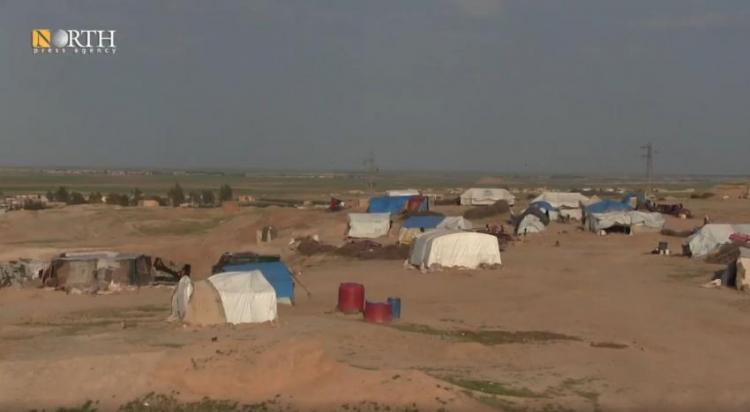Raqqa – North-Press Agency
Ahmad al-Hassan
The imposed lockdown to prevent the outbreak of the novel coronavirus has exacerbated the living conditions of the residents of al-Hokomia camp, 20km north of Raqqa, after a massive shortage of aid provided to them as a result of the diminished support of relief and humanitarian organizations in the recent period.
After the work of the residents stopped, it became difficult for the displaced in al-Hokomia camp to secure their daily livelihoods and even bread, as the region's bakeries do not sell them bread on the pretext that there are no provisions for them, according to IDPs residing in the camp.
Mohyi Ahmad, an IDP from the village of al-Shumaitiya in the eastern countryside of Deir ez-Zor, told North-Press: "We were working in agriculture in the region before the ban on movement began, and the young men were going to the city to work in the construction field and other daily jobs, but now we no longer have any way to secure our living."
Ahmad was previously living with his family members in al-Rajm camp near the village of al-Rajm al-Abyad, 45km north of Raqqa, where many organizations recorded data about them without providing any assistance, which made them move to al-Hatash camp near al-Hokomia camp.
In the countryside of Raqqa, there are more than 55 ad-hoc camps, which include more than 15,000 families from different Syrian regions. The largest of these camps is al-Hokomia camp that connects with al-Hatash and Hazima camps north of the city of Raqqa, and includes more than 1,100 families, most of whom are from the western and eastern countryside of Deir ez-Zor, in addition to IDPs from the eastern countryside of Aleppo.
Abu Mumtaz, an IDP from the village of Sibikhan in the eastern countryside of Deir ez-Zor who resides in al-Hatash camp, said that some families, whose work was stopped due to the imposed lockdown and fines imposed on violators, have resorted to picking up waste and sell plastic parts.
"We have not received any assistance from organizations operating in Raqqa city, so we earn our living from landfills; our children collect plastic materials and sell it for 100 SYP per kilogram to buy bread. Our tents are empty of the most basic necessities of life," he said.
The Supply Office of the People's Municipality in Raqqa also supervises rural bakeries and provides them with flour allocations according to the number of the indigenous people of the region, so the IDPs have to buy bread from private bakeries, which is more expensive and worse quantity compared to the regular bread, or to buy flour to bake it by themselves, where the price of a bag of flour weighing 50kg is sold for 14,000 Syrian pounds, according to the IDPs.
Mustafa Bozan, head of the Supply and Bakeries Office in the People's Municipality of Raqqa, said: "The office has granted flour licenses for bakeries in the countryside of Raqqa based on the number of residents in each area."
He added that a number of organizations have taken responsibility for distributing bread to the IDPs, among them Blumont organization, which distributes more than 25 tons of bread on a daily basis to random camps in the western and northern countryside of Raqqa.
Bozan explained that the lack of bread for the IDPs of Raqqa's countryside is a new problem that began with the lockdown imposed on the region and the failure of some organizations to operate, so the office is working to find a solution to this problem as soon as possible.
Um Mahmoud, a displaced woman from the eastern countryside of Aleppo, agrees with others that the situation they are living in is tragic. She says: "It has been four months since the last food basket we got from the organizations."
She added: "We no longer have food for our children, especially after the lockdown was imposed. Food has become very expensive; the price of a kilo of tomatoes has reached 800 Syrian pounds, and the prices of all vegetables have risen, and we basically cannot afford to buy bread."
The residents of al-Hokomia camp came from areas controlled by the Syrian government, where they were displaced during the war years, and have been receiving assistance from organizations operating in the city of Raqqa for the past three years.
Lou'ay al-Issa, head of the organizations office of the Raqqa Civil Council, said: "The office is working on a plan to distribute aid to residents of ad-hoc camps in the city's countryside, including al-Hokomia camp, after distributing aid to more than half of the population in the city of Raqqa and its countryside."
He added: "Many local organizations, such as "Concern", "Solidarity", and others have been targeting al-Hokomia camp, but their support has diminished in recent months due to the risks of the spread of the coronavirus epidemic."

